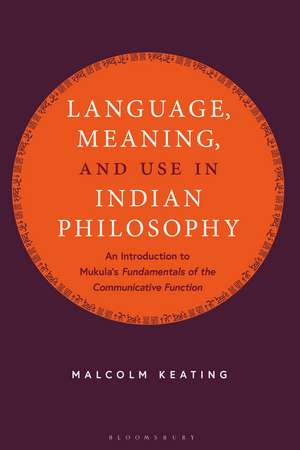Language, Meaning, and Use in Indian Philosophy: An Introduction to Mukula's "Fundamentals of the Communicative Function"
Autor Malcolm Keatingen Limba Engleză Paperback – 15 mai 2019
| Toate formatele și edițiile | Preț | Express |
|---|---|---|
| Paperback (1) | 168.59 lei 22-36 zile | |
| Bloomsbury Publishing – 15 mai 2019 | 168.59 lei 22-36 zile | |
| Hardback (1) | 500.25 lei 43-57 zile | |
| Bloomsbury Publishing – 15 mai 2019 | 500.25 lei 43-57 zile |
Preț: 168.59 lei
Preț vechi: 194.09 lei
-13% Nou
Puncte Express: 253
Preț estimativ în valută:
32.27€ • 35.06$ • 27.12£
32.27€ • 35.06$ • 27.12£
Carte disponibilă
Livrare economică 31 martie-14 aprilie
Preluare comenzi: 021 569.72.76
Specificații
ISBN-13: 9781350060760
ISBN-10: 1350060763
Pagini: 320
Dimensiuni: 156 x 234 x 32 mm
Greutate: 0.48 kg
Editura: Bloomsbury Publishing
Colecția Bloomsbury Academic
Locul publicării:London, United Kingdom
ISBN-10: 1350060763
Pagini: 320
Dimensiuni: 156 x 234 x 32 mm
Greutate: 0.48 kg
Editura: Bloomsbury Publishing
Colecția Bloomsbury Academic
Locul publicării:London, United Kingdom
Caracteristici
Features an up-to-date and complete translation of the Indian thinker Mukula's main work, Fundamentals of the Communicative Function
Notă biografică
Malcolm Keating is Assistant Professor of Philosophy at Yale-NUS College, Singapore.
Cuprins
List of FiguresList of TablesForeword, Larry McCreaHow to Use This Book Part I: IntroductionWhy did Mukula Bhatta write the Fundamentals? Indication and Resolving Incongruity: Mukula's Response Understanding Mukula's Context Further Reading by Topic - Locating Linguistic Philosophy - Theories of Word Meaning - Theories of Sentence Meaning - Poetics and Linguistics - After Mukula Part II: English Translation of "The Fundamentals of the Communicative Function" About This TranslationIntroductionVerses 1-15Appendix 1: Outline of the Fundamentals of the Communicative FunctionAppendix 2: Linguistic Examples used by Mukula Part III: Commentary on "The Fundamentals of the Communicative Function"About This CommentaryIntroductionVerses 1-15 Part IV: Sanskrit Text of the AbhidhavrttamatrkaTransliteration ConventionIntroduction Verses 1-15 Part V: Mukula and Contemporary Linguistic PhilosophyMukula Bhatta on Sentence Meaning and the Semantics-Pragmatics Distinction Mukula Bhatta on Primary and Secondary Meaning A Contemporary Approach to What is Said: François RecanatiWhat is Said, What is Expressed Lessons and Future Inquiry Part VI: Study ResourcesGlossary Sanskrit Pronunciation Chronology of Important Figures and Dates Bibliography Primary Sources Secondary Sources Subject and Name Index
Recenzii
The brilliance of Dr Keating's work lies in the fact that his book, at present the only book length exposition of Bhatt's life and work, is accessible to the lay reader interested in linguistics and philosophy, despite the extremely complex subject matter it deals with.
In this superb volume, Malcolm Keating has given us a clear window into classical indian theories of figurative speech and the philosophy of language. He shows us that and how sophisticated Indian debates regarding figurative speech can inform contemporary theories of meaning as well. This is a philosophically and philologically precise monograph that should be read not only by anyone interested in Indian literary theory and Indian philosophy of language, but by anybody who cares about meaning and metaphor, and how cross-cultural philosophy can improve our understanding of these phenomena.
Language, Meaning, and Use in Indian Philosophy is a wonderfully clear introduction to and translation of Mukula Bha??a's work on poetics and linguistic philosophy. Malcolm Keating has translated this work with non-Sanskritists in mind, and this book will be of great use not only to specialists in Indian philosophy, but also to readers interested in issues in comparative aesthetics and linguistics. In the final sections of the book, Keating skillfully draws on contemporary theories of semantics and metaphor to show how Mukula's approach can enrich and broaden our discussions of how language generates meaning.
In this superb volume, Malcolm Keating has given us a clear window into classical indian theories of figurative speech and the philosophy of language. He shows us that and how sophisticated Indian debates regarding figurative speech can inform contemporary theories of meaning as well. This is a philosophically and philologically precise monograph that should be read not only by anyone interested in Indian literary theory and Indian philosophy of language, but by anybody who cares about meaning and metaphor, and how cross-cultural philosophy can improve our understanding of these phenomena.
Language, Meaning, and Use in Indian Philosophy is a wonderfully clear introduction to and translation of Mukula Bha??a's work on poetics and linguistic philosophy. Malcolm Keating has translated this work with non-Sanskritists in mind, and this book will be of great use not only to specialists in Indian philosophy, but also to readers interested in issues in comparative aesthetics and linguistics. In the final sections of the book, Keating skillfully draws on contemporary theories of semantics and metaphor to show how Mukula's approach can enrich and broaden our discussions of how language generates meaning.
